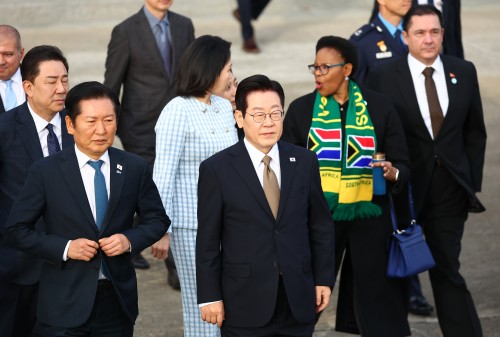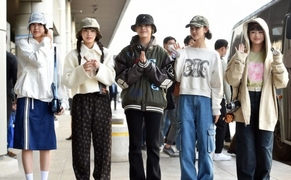 |
| President Lee Jae-myung boards Air Force One at Seoul Air Base in Seongnam on November 17, accompanied by Democratic Party leader Jung Chung-rae, before departing for a four-nation tour including the UAE, Egypt and Türkiye following the G20 Summit. / Source: Yonhap News |
President Lee Jae-myung’s job approval rating, which had risen on the strength of recent foreign-policy achievements, is now losing momentum as backlash intensifies over the prosecution’s decision to drop an appeal in the Daejang-dong corruption case. The decline comes despite positive assessments following the APEC Summit and the conclusion of Korea–U.S. tariff negotiations.
According to polling released on November 17, Lee’s approval rating fell 4 percentage points from 63% to 59% in a Korea Gallup survey conducted November 11–13. A Realmeter poll, conducted November 10–14 on behalf of Energy Economy News, showed a similar drop of 2.2 percentage points, from 56.7% to 54.5%.
Diplomatic gains overshadowed by domestic controversy
Analysts point to the “Daejang-dong appeal withdrawal” controversy as the primary cause of the downturn. The debate erupted on November 10 when then-Acting Prosecutor General Noh Man-seok said he had “decided not to appeal after careful consideration,” only for Seoul Central District Prosecutor Jung Jin-woo to counter publicly that the decision differed from the prosecution’s internal view—fueling suspicion of presidential office interference.
Realmeter noted that the “fierce partisan confrontation and political strife” surrounding the withdrawal heightened public fatigue and became a major driver of Lee’s approval decline. Korea Gallup similarly said the controversy came while the political aftershocks of the ruling party’s early-November push for a “trial suspension bill” were still lingering.
Gallup’s polling found that 48% of respondents viewed the decision not to appeal the Daejang-dong case as “inappropriate,” compared with 29% who viewed it as “appropriate.” The results suggest that even within pro-government voter groups, negativity toward Lee’s handling of the issue is growing.
Other pressures: Constitution-respect task force, housing policy fallout
The government’s recent launch of a “Constitution-Respect Task Force,” designed to review potential involvement of public officials in alleged illegal plans for martial law on December 3, has also drawn criticism from the opposition, which branded it a “surveillance task force” and an act of “fear politics.” This narrative, political observers say, has contributed to a softening of presidential support.
The aftereffects of the government’s October 15 real-estate package have added to the pressure. Seniors struggling with home-equity constraints and end-users affected by the collapse of gap investment have expressed frustration, while controversial remarks from First Vice Land Minister Lee Sang-kyung last month also stirred public resentment.
Even so, analysts note that Lee’s approval remaining in the mid-to-high-50% range reflects effective “expectation management.” Political analyst Jung Kwang-jae of the Dongyeon Political Institute said, “By repeatedly emphasizing the difficulty of the tariff negotiations with the United States, the government kept public expectations in check. Visible indicators like the KOSPI surpassing 4000 also played a stabilizing role.”
Realmeter surveyed 2,510 adults aged 18 and older nationwide from November 10–14, with a margin of error of ±2.0 percentage points at a 95% confidence level. Korea Gallup surveyed 1,003 adults from November 11–13, with a margin of error of ±3.1 percentage points. Full results are available on the websites of Realmeter, Korea Gallup and the National Election Survey Deliberation Commission.
Most Read
-
1
-
2
-
3
-
4
-
5
-
6
-
7





















